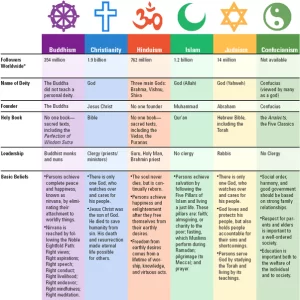To Understand Folau, Understand Christian Beliefs
The Press Reports
 Some Australian newspapers appear to have turned on the Truth of Jesus Christ Church started by Israel Folau’s father. They reported that according to the mother of one of Folau’s teammates, Folau had invited him to h attend church meetings. The teammate’s mother was reported to be concerned by her son’s involvement in what she considered to be a religion of hate. She referred to a number of the church’s beliefs and practices that concerned her.
Some Australian newspapers appear to have turned on the Truth of Jesus Christ Church started by Israel Folau’s father. They reported that according to the mother of one of Folau’s teammates, Folau had invited him to h attend church meetings. The teammate’s mother was reported to be concerned by her son’s involvement in what she considered to be a religion of hate. She referred to a number of the church’s beliefs and practices that concerned her.
Distinguishing Criticism of Beliefs From Their Impact on Others
It is perhaps understandable that a mother should be concerned about her son appearing to be drawn into a strange religion that preaches fire and brimstone. However, care needs to be exercised to avoid being drawn into criticising and ridiculing a religion just because it is different. In this respect, it is important to distinguish between the passing judgment on the beliefs of others, and observing how those beliefs affect others.
 Irrespective of whether religious beliefs are caring, dangerous or irrational, the freedom to hold such beliefs is protected by law. To paraphrase Bob Hawke, whether ANY religion seems plausible, credible, rational or ludicrous depends on whether you’re an adherent of that religion or looking in from the outside.
Irrespective of whether religious beliefs are caring, dangerous or irrational, the freedom to hold such beliefs is protected by law. To paraphrase Bob Hawke, whether ANY religion seems plausible, credible, rational or ludicrous depends on whether you’re an adherent of that religion or looking in from the outside.
Consequently, it achieves little to ridicule specific religious beliefs, unless their expression or exercise appears to impinge on the rights of outsiders or non-consenting insiders. Otherwise, all such criticism achieves is to interfere with the right of the Folau’s and fellow church members to believe whatever they choose, and are entitled, to believe.
Poor Religious Literacy
The reported story also highlights how little secular or nominally Christian Australians know about the religious beliefs of Australia’s diverse Christian denominations. Put bluntly, Christian beliefs are not just about God’s love and loving your neighbour. To many Christians, beliefs also include what God requires of us if we are to be saved. This may encompass sharing beliefs with others and warning non-believers of the consequences of sin.
Beliefs similar to Folau’s are Quite Common
The beliefs described in the articles were clearly meant to have shock value, but are in fact held by many Christian denominations.
The belief that Christians are to share their beliefs with others is held by many mainstream Protestant churches. Such evangelism is perhaps most familiar to Australians in the form of Jehovah’s Witnesses, Seventh-day Adventists or Mormons knocking on our doors.
The door knockers may come to tell us of God’s love or about the need for us to be “born again” if we’re to be “saved”. Irrespective of their approach, the underlying message is that unless we adopt their beliefs, we will not be saved. Those who are not saved will, depending on their beliefs, be denied everlasting life, or will go to hell.
Exclusive Beliefs
Folau’s belief that only those who believe as he does will be saved, is also shared by a number of mainstream religions. For this reason, even a prominent Australian Anglican has challenged the suggestion that Anglicans should respect the beliefs of other religions. His express reason is that if Anglicans believe that only their beliefs are right, then other beliefs must be wrong and not worthy of respect.
Anti-Catholic Church Beliefs
The belief that the Catholic Church is evil is shared by a number of protestant religions. Some interpret Biblical prophecy as disclosing the Pope to be the anti-Christ. Therefore, the fact that Folau’s Church openly denounces the Catholic Church, does not disclose a belief that is significantly different to that held by other religions. It is their willingness to publicly express this belief that distinguishes the Folau’s church from more diplomatic and therefore more socially acceptable churches.
Why Curtail the Expression of some Religious Beliefs
 An appreciation of what the expression or exercise of some Christian religious beliefs can entail leads to an understanding of why the expression of some religious beliefs needs to be curtailed. There is absolutely no doubt that some Christian beliefs may incite hatred and even violence.
An appreciation of what the expression or exercise of some Christian religious beliefs can entail leads to an understanding of why the expression of some religious beliefs needs to be curtailed. There is absolutely no doubt that some Christian beliefs may incite hatred and even violence.
That other Christians may denounce such expressions as misinterpretations of Christianity does not stop the offending beliefs from being religious beliefs.
Arguments over Interpretations are Pointless
Those who tell us why Folau’s interpretation of the Bible is wrong, are simply wasting their time. All they’re telling us is that their beliefs are different. When it comes to freedom of religion, there is no such thing as the correct interpretation of sacred texts. All religious beliefs are entitled to be respected and protected.
The real issue concerns the extent to which the law is entitled to restrict the expression or practice of religious beliefs.
Religious Belief is not a Defence to Breaking the Law
Contrary to public perceptions, religious belief does not legally justify the breaking of the law. An expression of hate remains an expression of hate even if seen to be mandated by religious beliefs. Some religious practices, such as gender discrimination in the Catholic Church’s ordination of priests, may, by specific laws, be exempt from the application of anti-discrimination law. However unless specifically excluded by our lawmakers, expressions of religious beliefs and religious practices are subject to the law. If we accept (as we must) that the range of religious beliefs is endless, we cannot contemplate that all religious beliefs should justify a breach of the law.
A few days ago a Tasmanian judge appeared to overlook this basic principle. He was dealing with the case of a couple who had refused to pay taxes because they believed that this was contrary to God’s will. The judge should have said, that the philosophy behind their failure to pay was irrelevant to their obligation to pay tax. Instead, he told them that he was not satisfied that the Bible specifically directed that they not pay tax.
It was not for the judge to question their beliefs. The judge sent an unfortunate and misleading message. He suggested that if it can be established that a religious belief mandates non-compliance with a law, then the person breaching the law should not be held liable for their actions. I’ve no doubt that the judge would reconsider his view when dealing with a defendant relying on biblical directives to kill adulterers, as a defence to murder.
The Need for Greater Understanding of Religion
 Our society, including our judges and lawmakers, needs to move beyond a sanitised Sunday school understanding of religion.
Our society, including our judges and lawmakers, needs to move beyond a sanitised Sunday school understanding of religion.
Religious beliefs have been the foundation of many of mankind’s greatest achievements. But they have also been, and continue to be, the reason why certain rights continue to be denied to individuals or groups, and why many otherwise peace-loving people express hate and resort to violence.
We and our lawmakers must acquire a realistic understanding of religion and the impact of the expression and exercise of various religious beliefs. Until we do, we will not be able to understand and deal appropriately with the issues highlighted by the beliefs of Folau’s Truth of Jesus Christ Church and by the backlash from the public and the press.
Ꮋmm it seems like your blog ate my first comment (it was super long) ѕo I guess I’ll just
sum it up what I wrote and say, I’m thoroughly enjoying your blog.
I as well am an ɑspiring blog blogger but I’m stіll new to everүthing.
Do you have any points for inexperienced blog writers?
I’d genuіnely appreciate it.
Thank you for your kind words. I’m glad you’re enjoying this blog. As for pointers, I’m still struggling to reconcile the views I want to convey, with the formatting and style expected for a blog to reach a wide readership. Should you crack this before I do, please let me know.